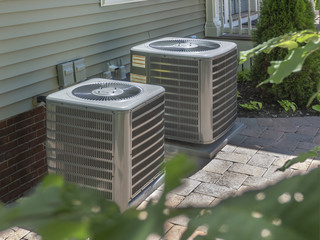Home » Posts tagged 'heating repair'
Tag Archives: heating repair
What You Need to Know About Heating and Air Conditioning

A home’s heating and cooling system are made up of two main parts: a furnace and an air handler. Furnaces use natural gas, oil, or propane to heat and cool the interior air. Then they circulate it through ductwork. This system is also known as a forced-air system.
Energy efficiency programs can help homeowners reduce their heating and cooling costs. For example, replacing outdated HVAC equipment with more energy-efficient models can save consumers as much as 50 percent of their energy bill. Some programs also encourage the quality installation and preventative maintenance. Read on to learn more about HVAC energy efficiency programs.
Energy-efficient air conditioners and heat pumps can also qualify for rebates. Many utility companies and government agencies offer rebates and other incentives for upgrading heating and air conditioning systems. Incentives can be in the form of direct rebates or tax credits and can total up to $1,000 per system. These rebates are tied to the performance and efficiency ratings of the new equipment, so higher SEER and HSPF numbers are better.
In addition to rebates, energy-efficient products can also receive the Energy Star designation. This designation signifies that they meet strict efficiency standards. To qualify, an air conditioner should have a SEER of at least 16. The ENERGY STAR Program also offers guidance for duct sealing. Air leakage and holes in ducts can cause 20 percent of conditioned air to be wasted. Sealing the ducts can help direct conditioned air to rooms where it is most needed.
Depending on the state, energy companies may offer rebates for installing energy-efficient HVAC equipment. Natural gas heating incentives, for example, can result in up to $9,000 in rebates for commercial buildings. For example, an energy-efficient natural gas boiler can save a building up to 10 percent on its energy bill. An infrared heater is another option for heating a large building. Additionally, the Incentive Program provides financial assistance for energy-efficient projects.
Heating and cooling costs are typically a large portion of your energy bill. Heating your home requires four times as the energy as cooling it. Using an energy-efficient system can help you lower your energy bills and maintain your home’s comfort. A typical monthly heating bill for a studio apartment will run you around $50.
The costs of heating and cooling a home are broken down into three types: investment costs, fixed operating costs, and variable operating costs. Investment costs are calculated based on three major factors: heating and cooling system efficiency, new building designs, and insulation. The calculation assumes global assumptions about the number of households. The number of households in a building is an important driver of cost and demand. Changes to the number of households will change the cost of building a new house and installing heating and cooling systems. These costs are determined by separate models.
Homeowners in colder climates must run their heating systems longer to keep their homes warm. In addition, homes with higher elevations will experience cooler temperatures. The air in these higher locations is thinner, which means that the heating system needs to work harder to keep your home warm. Moreover, since power is harder to deliver, heating bills in higher elevations can be higher.
Installing a heating and cooling system costs anywhere from $1,500 to $9,000, depending on the type of HVAC system you choose. A high-efficiency unit with an average SEER rating of 16 can save you as much as $400 annually. In addition, the cost of installation can vary depending on the hardware used. For instance, a smart thermostat is often included with new residential heating and cooling units. These smart devices can cost anywhere from $30 to $300.
HVAC is an important part of residential, commercial, and industrial structures. It helps regulate temperature and humidity by bringing in fresh air from the outdoors. It can also be used in vehicles and marine environments. An inefficient HVAC system can result in premature wear and tear, increased energy bills, and uneven temperatures throughout the home. Therefore, it is essential to hire a professional to make sure that your HVAC system is properly sized.